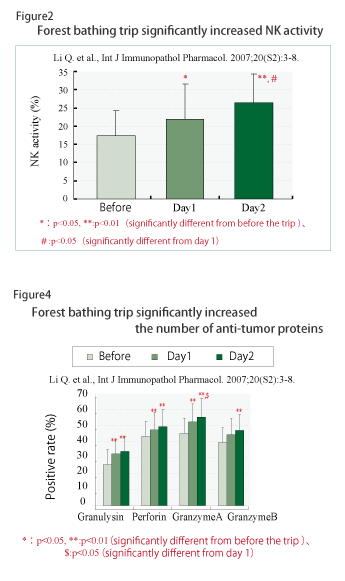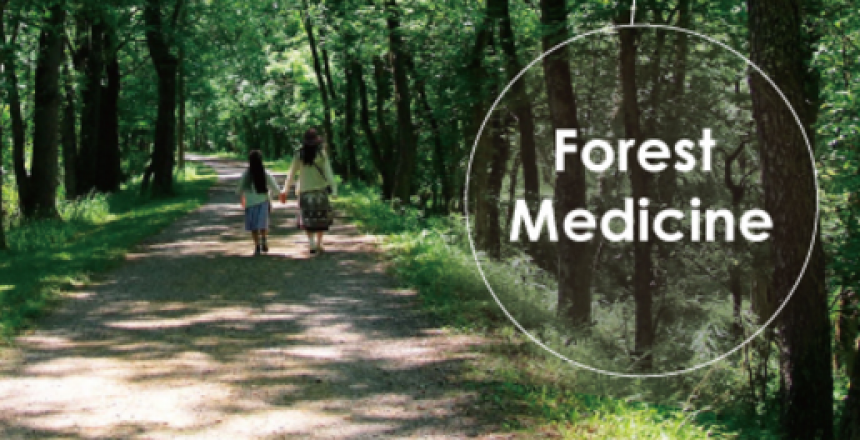The Japanese have a concept called “Shinrin-yoku”, which has been translated as “forest bathing”. The idea refers to staying relatively long periods, several hours to several days, in the forest. A number of studies have found that forest bathing improves health.
We’re accustomed to the idea that being in natural settings soothes the soul, that nature appeals to us in certain ways that nothing else can quite reach. We’re now able to add to our knowledge of this phenomenon by measuring physiological variables of people in nature and see how they vary from being in the city.
Japanese researchers have done a number of studies on forest bathing.
Most of the variables that we associate with stress decline. For instance, cortisol, a stress hormone, when measured in saliva, declines.
Pulse rate and blood pressure are significantly lower when forest bathing. All of this occurs whether just viewing the forest, or with walking also. You can read a review of these studies here.
Another researcher has studied the effects of forest bathing on immune function. See charts below.

Natural killer cell activity and number increased with three days and two nights in the forests of Japan, as did the amount of anti-tumor proteins. See the study here.
Natural killer cell activity is inversely related to cortisol, so this result agrees with the first study. Stress can lower immune activity by this means.
The question is, why should natural landscapes have this affect on us?
Man evolved over millions of years in natural landscapes, and cities are, in evolutionary terms, very unnatural. The lowered stress in a natural environment is likely the way we’re meant to be, and the stress of living in unnatural environments is, well, unnatural.
Even though there would have been plenty of stresses in a natural environment, such as the pressure to obtain food, and fighting or fleeing enemies or wild animals, these stresses may have been short-lived.
By contrast, the stress of city life may be a constant, low-level grind that’s bad for health.
So, get out into nature and relieve some stress and get healthier.
Going into the forest barefoot can add to the health benefits.
PS: You can support this site by purchasing through my Supplements Buying Guide for Men. No extra cost to you.
[thrive_link color=’blue’ link=’https://www.subscribepage.com/l6x7w5′ target=’_blank’ size=’medium’ align=’aligncenter’]Subscribe and get my free book on fat loss[/thrive_link]










8 Comments
The Japanese got it right! Don’t know about the recent gens of Germans, but pre 1950s before I emigrated Sunday was a big hiking day through local woods for many families or hiking clubs enjoying birdwatching or collecting wild mushrooms or berries without the hazards of poison plants like ivy, except for easily avoidable patches of painful nettles, or wild animals. For more sedentary folk there was planting and harvesting in Schrebergaerten with small cottages similar to WWII victory gardens.
In Japan most forests are pine forests. Part of the attraction of forest bathing is to breathe in the wonderfully soothing smell of the resin. It is probably the terpenoids you breathe in that lower stress levels. Don’t you live near pine or spruce trees? Then open a bottle of Tea Tree Oil and breathe in……
Re PeterB comment, if pine aromtics are a factor, you may want to use old fashioned authentic Pine oil disinfectant containing 8% pine oil as a household germicide, not the fake PineSol containing mainly germicidal quats
The Japanese seem to have a lot of things (traditions, rituals etc.) that improve their health and therefore make them live longer/live healthier lives in general. You also seem to focus more and more on them (which I find great)
Thanks, Titus. I find the Japanese to be a very admirable people.
Live in the forest, love the forest, but know a number of folks who have contracted Lyme Disease and one who recently got West Nile.